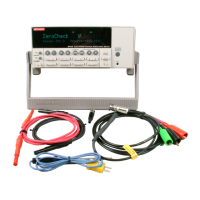IEEE-488 Reference
3-25
3. Command path rules:
A. Each new program message must begin with the root command, unless it is optional
(e.g., [:SENSe]). If the root is optional, simply treat a command word on the next level
as the root.
B. The colon (:) at the beginning of a program message is optional and need not be used.
Example:
:stat:pres = stat:pres
C. When the path pointer detects a colon (:) it will move down to the next command level.
An exception is when the path pointer detects a semicolon (;), which is used to separate
commands within the program message (see next rule).
D. When the path pointer detects a colon (:) that immediately follows a semicolon (;), it
resets back to the root level.
E. The path pointer can only move down. It cannot be moved up a level. Executing a com-
mand at a higher level requires that you start over at the root command.
4. Using common commands and SCPI commands in same message: Both common com-
mands and SCPI commands can be used in the same message as long as they are separated
by semicolons (;). A common command can be executed at any command level and will not
affect the path pointer. Example:
:stat:oper:enab <NRf>; ptr <NRf>; *ESE <NRf>; ntr <NRf>
5. Program Message Terminator (PMT): Each program message must be terminated with an
LF (line feed), EOI (end or identify) or an LF + EOI. The bus will hang if your computer
does not provide this termination. The following example shows how a multiple command
program message must be terminated:
:rout:open all; scan (@1:5) <PMT>
6. Command execution rules:
A. Commands are executed in the order that they are presented in the program message.
B. An invalid command will generate an error and, of course, not be executed.
C. Valid commands that precede an invalid command in a multiple command program
message will be executed.
D. Valid commands that follow an invalid command in a multiple command program mes-
sage will be ignored.

